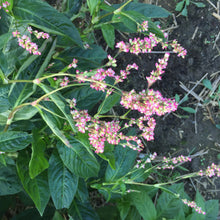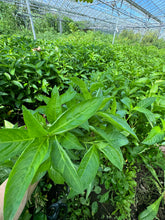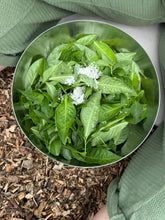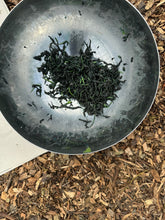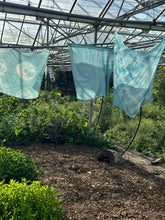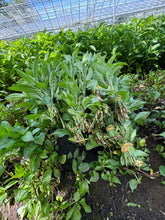"Senbon" Persicaria Tinctoria Seed Pink Flowering long leaf Indigo Seed
Regular price
£5.00
Sale
THIS PRODUCT DOES NOT SHIP OUTSIDE OF UK.
2025 SEED WILL BE AVAILABLE NOVEMBER
"Senbon" Persicaria Tinctoria is a long leaf pink flowering, widely grown in the USA.
Sow seeds into tray, prick out and pot on to establish, or sow directly into cells in groups of three or more depending on soil.
Plant out after the last frost in your region. If exposed to wind over long periods (weeks) the leaves will redden, interaction with this particular element could trigger early flowering as would minimal in sunlight. Full to partial sun.is best or a minimum of 8 hours. Have noted indigo grown in locations which offer some shade though the hotter months contain more indigo, therefore offering some shading where necessary is recommended.
The commercial green house in which we established the first crop of indigo is notably sandy soil. Therefore, plants grow well but in smaller groupings of 3-5 plants per spot. The outdoor location was initial grazing and therefore the microbial health good and soil structure excellent, here indigo is planted in groups of ten or more and is thriving.
On planting, we've found adding organic chicken manure or pellets, to the planting spot, assists greatly in maintaining the nitrogen levels. All varietals of Persicaria tinctoria enjoy, nitrogen based feeds preferably organic, so as it is safe for you, your family and any pets. Most of all it is kinder to the soil in which your dye plants are growing. Water the indigo well, as they are heavy drinkers.
Originally, Persicaria tinctoria grew wild on river banks in Asia. Stems sprouts new roots from nodes readily, when left in water. Plant numbers may also be increased using this method. Cut stems remove all leaves and place in water until roots have grown out from nodes, circa 10 days. The stems can then be potted up in saturated soil or compost, saturation should be maintained for at least 48 hours so that the roots can adjust to the new environment.
Plant cuttings deep into the soil so that only the new green tips are showing on the surface of the soil and nodes with roots are completely buried. Roots at this stage are supporting not only the general growth but also the over all structure of the plants too.
Two to three weeks after planting and in all cases, seedlings or cuttings, pinch out centre leaves, to encouraging bushing further.
These leaves or tips can then be used to make fresh leaf indigo dye bath. The simplest method is to place tips in a bowl, incorporate sea salt with to express the indoxyl, thereby, breaking down the cells walls in the leaf. to release the indoxyl, which contains indican, the precursor of indigo dye. This is a fun activity for all age groups, works brilliantly on protein fibres such as silk and wool. Wear gloves if you don't want blue hands.
We generally harvest plants at 50- 60cm in height.
When harvesting leave 6-8 cms at base of stem for regrowth. This will encourage the second harvest to grow in more densely. Feed well poste harvest too, in order to boost the return of new foliage. We find organic tomato liquid fertiliser works well.
At Bailiwick Blue we also folia feed in season. Folia feeding encourages plants growth and therefore leaf production. All leaves have tiny mouths on the back side, which exchange oxygen for carbon dioxide. These little mouths are called "Stoma" or "Stomates" which release oxygen and exchange for carbon and nutrient which are beneficial to plant growth.
Timely harvesting is required, Harvesting after plants are blooming will alter the indigo quantity and quality, allegedly losing approximately 20-25% plus depending on the status of the flowers and as to whether flowers have become seed heads.
Another good outdoor performer Maruba
3g packet circa 500 seeds ( 60 spots at a ratio of 5 seeds per cell)
6g packet circa 1000 seeds (200 spots at a ratio of 5 seeds per cell)
For wholesale quantities please contact: george@bailiwickblue.com
Grown & Harvest in the Bailiwick of Guernsey, GB.







